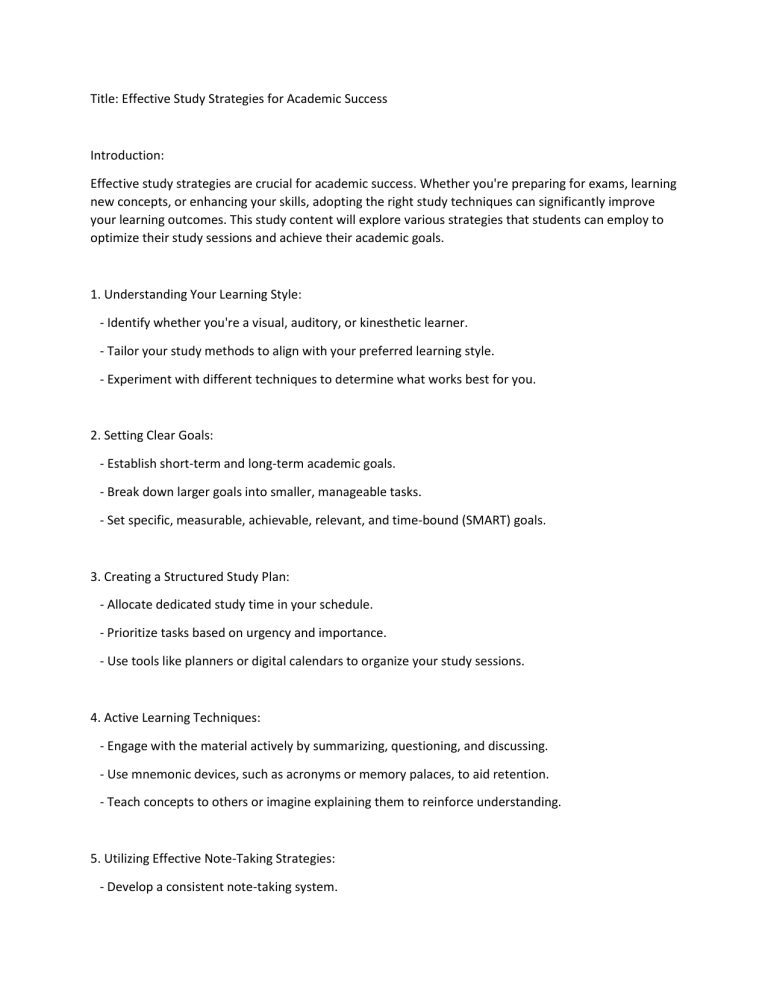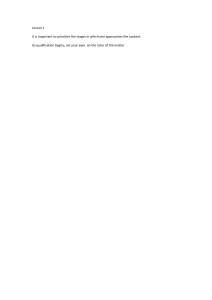
Title: Effective Study Strategies for Academic Success Introduction: Effective study strategies are crucial for academic success. Whether you're preparing for exams, learning new concepts, or enhancing your skills, adopting the right study techniques can significantly improve your learning outcomes. This study content will explore various strategies that students can employ to optimize their study sessions and achieve their academic goals. 1. Understanding Your Learning Style: - Identify whether you're a visual, auditory, or kinesthetic learner. - Tailor your study methods to align with your preferred learning style. - Experiment with different techniques to determine what works best for you. 2. Setting Clear Goals: - Establish short-term and long-term academic goals. - Break down larger goals into smaller, manageable tasks. - Set specific, measurable, achievable, relevant, and time-bound (SMART) goals. 3. Creating a Structured Study Plan: - Allocate dedicated study time in your schedule. - Prioritize tasks based on urgency and importance. - Use tools like planners or digital calendars to organize your study sessions. 4. Active Learning Techniques: - Engage with the material actively by summarizing, questioning, and discussing. - Use mnemonic devices, such as acronyms or memory palaces, to aid retention. - Teach concepts to others or imagine explaining them to reinforce understanding. 5. Utilizing Effective Note-Taking Strategies: - Develop a consistent note-taking system. - Use techniques like Cornell Notes or the outline method. - Review and revise your notes regularly to reinforce learning. 6. Employing Effective Time Management: - Break study sessions into manageable chunks with short breaks in between. - Use the Pomodoro Technique or similar methods to enhance focus and productivity. - Avoid multitasking and distractions during study time. 7. Leveraging Technology Wisely: - Use educational apps, online resources, and digital tools to supplement learning. - Utilize tools for organization, time management, and collaborative studying. - Be mindful of screen time and prioritize active engagement over passive consumption. 8. Practicing Self-Care: - Prioritize adequate sleep, nutrition, and exercise to support cognitive function. - Take regular breaks and incorporate relaxation techniques to reduce stress. - Seek support from peers, teachers, or counselors if feeling overwhelmed. 9. Monitoring Progress and Adjusting Strategies: - Track your academic progress and assess the effectiveness of your study methods. - Be flexible and willing to adjust your strategies based on feedback and outcomes. - Celebrate achievements and learn from setbacks to continuously improve. Conclusion: By incorporating these effective study strategies into your academic routine, you can enhance your learning experience, improve retention, and ultimately achieve academic success. Experiment with different techniques, stay consistent, and don't hesitate to seek support when needed. With dedication and perseverance, you can reach your academic goals and excel in your studies.


